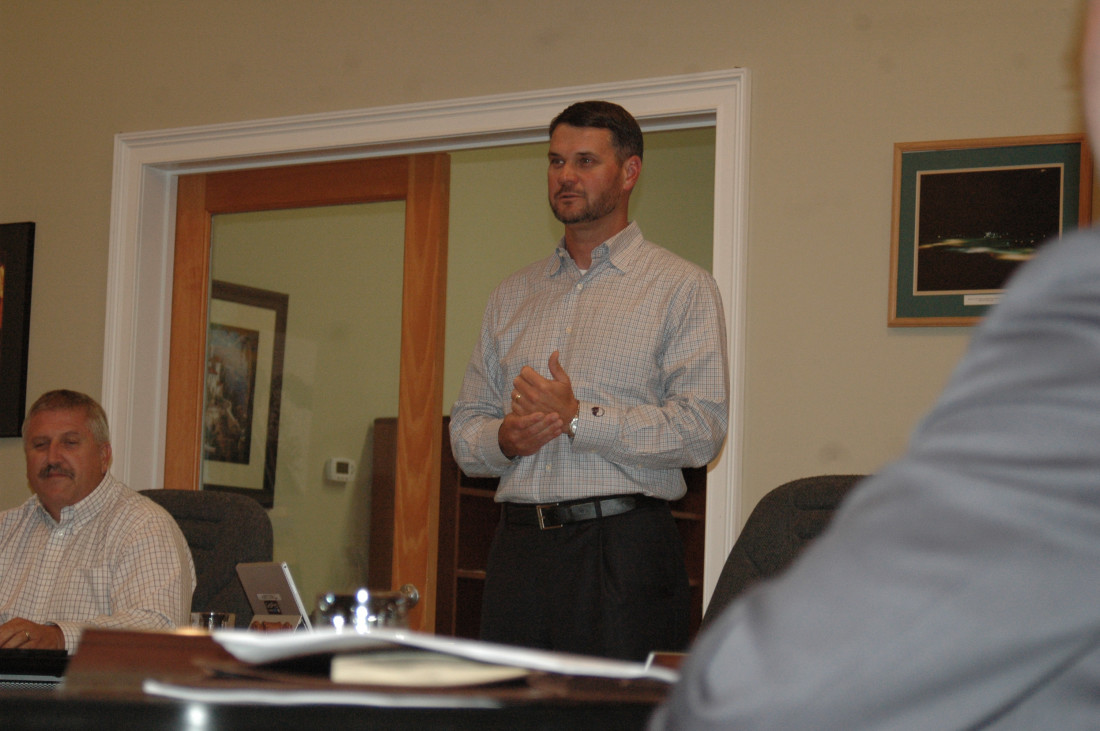On Monday, July 11, the Western North Carolina Air Quality Agency renewed Duke Energy Progress’ Title V permit for its Lake Julian coal plant facility. This type of operating permit is regulated under the federal Clean Air Act and must be renewed every five years by most businesses whose facilities emit hazardous air pollutants, whether or not there are any proposed changes at their facilities.
The new permit will include several modifications, Britt Lovin, chairman of the WNC Air Quality Agency board, told members of the board and the public. Modifications will include references to the Mercury Air Toxic Standard, the Acid Rain Program, Clean Air Interstate Rule provisions and general conditions, and a new sulfur dioxide limit.
Lovin thanked Ashley Featherstone, the agency’s permitting program manager, and David Brigman, the agency’s director, for dedicating their time and efforts to reading and reviewing approximately 700 public comments made in response to the proposed renewal.
Joel Storrow, the newest member of the WNC Air Quality Board, speaking at his first meeting, said, “In my day job as an engineer, I did a lot of regulatory compliance situations, and I am just really impressed with the staff and all the thoroughness that they’ve gone through in evaluating the situation in the modeling versus the monitoring.”
When Title V permits come up for renewal, Featherstone explained, the agency board is required to issue a public notice, provide a public comment period, and submit the draft permit to the Environmental Protection Agency for its review and commentary. This process was begun more than a year ago and has included a public hearing.
Prior to the approval of the new permit, Duke’s Lake Julian facility had been operating under a permit application shield, Featherstone explained, as a result of Duke having submitting its application on time, which allowed the utility to continue operating under the old permit pending approval of a new one, even though the old permit’s expiration date had passed.
“Duke plans to have the gas turbines up and running in 2020. Deconstruction of the coal boilers will occur after that,” Featherstone told the board, referring to both Duke’s proposed natural gas plant in Asheville and the closure of its Lake Julian coal-burning plant. She said Duke hopes to start construction on the natural-gas plant this November.
The Sierra Club raised concerns about the proposed renewal in March 2015, based on a computer-generated model of WNC air quality that examined sulfur dioxide levels, as regulated under the National Ambient Air Quality Standard (NAAQS). The study suggested that emissions from Duke’s Lake Julian coal-burning plant appears to have resulted in levels of sulfur dioxide in excess of the standard.
According to Featherstone, the Clean Air Act requires the EPA to set National Ambient Air Quality Standards. The EPA updates those standards every few years.
“After a standard is issued, EPA must designate areas as meeting the standard – attainment – or not meeting the standard – nonattainment,” she explained. “Alternatively, areas can be designated as unclassifiable if data is lacking to make the determination.”
The EPA issued its new sulfur dioxide standard in 2010, but deferred its 2013 issuance of attainment-nonattainment designations for areas with ambient air-quality monitors. In response, the Sierra Club and Natural Resources Defense Council filed a lawsuit against the EPA seeking to force the federal agency to establish designations for all communities and areas.
As part of the WNC Air Quality Agency’sevaluation of Duke’s application for renewal, the agency requested additional information from the utility, after which “the board made some amendments to the draft permit and submitted it to EPA for their review in April of 2016,” Featherstone said.
According to Featherstone, the Sierra Club asked the agency to include the 2010 sulfur dioxide standard as part of the permit renewal. “We did not do that because we are required to follow the procedures in the Clean Air Act and, in this case, EPA’s Data Requirements Rule, which specifies how all state and local air agencies in the nation are to implement this standard,” she said.
“The SO2 standard has been a source of a lot of public interest,” Featherstone noted. “There has been a lot of talk about modeling by the Sierra Club – possibly [placing and operating] air-condition monitors.”
Featherstone explained that modeling is based on reported emissions and weather data. She said the goal of modeling is to predict a concentration of a pollutant in the air, whereas monitors measure actual ambient conditions: “To summarize, we’ve been looking at modeling, or monitoring – and it’s pretty well agreed upon that modeling is more conservative. We feel confident that the [existing coal-powered] facility can pass and show compliance with modeling.
“If modeling does not show compliance or is disapproved,” she continued, “monitoring will be required and must begin in January of 2017.” If Duke’s emissions don’t meet its permit levels or models don’t predict compliance, Featherstone said the alternative would then have to be monitoring near the facility site.
Once a permit has been filed, legal objections can be brought against it, she he said, noting that the Sierra Club was ready to file a petition if the permit renewal was approved.
Featherstone said that those who are interested in the process leading up to the permit renewal can learn more by reading the air agency board’s minutes, which can be found on the agency’s website. Beginning in May 2015 and continuing through July 2016, there has been a standing board agenda item, “Duke Energy Progress Permit Renewal Update,” she explained, which includes updated information about the permit application and what the WNC Air Quality Agency is doing to address the sulfur dioxide standard.
AQ-IQ award ceremony
At the start of the meeting, the board announced the winners of North Carolina 2015-2016 AQ-IQ contest. Middle school students from all parts of Western North Carolina submitted art projects, posters, paintings, games, and videos that highlighted an air-quality problem and proposed solutions to that problem, which were judged based on their artistic creativity.
Sheila Holman, director of the North Carolina Division of Air Quality, and Lovin presented the following winners with their awards:
Artistic pieces
First place: Elenie Lazaro and Lily Caldwell, from Waynesville Middle School, for their Acid Rain art piece
Second place: Julie Reed, from Henderson Middle School, for her collage on Air Pollution
Third place (tie): Zee Prince, from Henderson Middle School, for her Acid Rain art poster, and Augusta Haywood, Isabella Pyles, and Katherine Lawson, all from Henderson Middle School, for their artistic piece “The Effects of Air Pollution”
Games

First place: Leah Morrissey, from Cane Creek Middle School, for her AQI Mystery Game
Second place: Caleb Raper, from Cane Creek Middle School, for his Taking Steps to a Better World Game
Third place: Wilton Graves, from Cane Creek Middle School, for his Air Heads Game
Posters

First place: Ellery Parmenter, Emma Aanonsen, and Maya Fleagle, from Evergreen Community Charter School, for their “Fresh vs. Fowl” poster
Second place: Tim Barham, from Cane Creek Middle School, for his poster “Car Exhaust and How It Affects the Environment”
Third place (tie): Emma Hendricks and Gracie Glance, from Waynesville Middle School, for their “Toxic Air Pollution” poster, and Emko Kottowitz, from Evergreen Community Charter School, for his “World Crisis” poster
Videos
First place: Clara Hockenberry and Sophie Tanker, Hendersonville Middle School, for their video “Industrial Air Pollutions and Its Problems”
Second place: Eli Dowler and Jennings Yoder, from Cane Creek Middle School, for their video “Go Green…or Stay Home”
Third place: Daniela Ayala, from Hendersonville Middle School, for her video “Air Pollution Can Come to a Solution”




Before you comment
The comments section is here to provide a platform for civil dialogue on the issues we face together as a local community. Xpress is committed to offering this platform for all voices, but when the tone of the discussion gets nasty or strays off topic, we believe many people choose not to participate. Xpress editors are determined to moderate comments to ensure a constructive interchange is maintained. All comments judged not to be in keeping with the spirit of civil discourse will be removed and repeat violators will be banned. See here for our terms of service. Thank you for being part of this effort to promote respectful discussion.